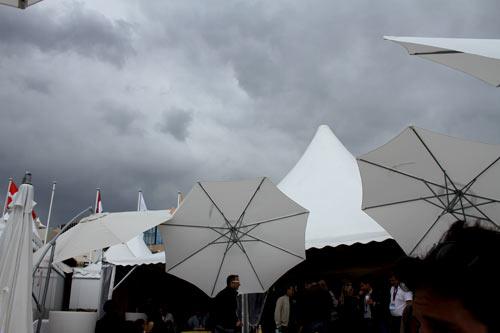 Throughout the Cannes Film Festival, short filmmakers, feature film producers, distributors, film magazines, actors and people from all over the industry have gathered in the sunny south of France to take their projects and ideas to the next level.
Throughout the Cannes Film Festival, short filmmakers, feature film producers, distributors, film magazines, actors and people from all over the industry have gathered in the sunny south of France to take their projects and ideas to the next level.
This year has had its fair share of drama from a tsunami to volcanoes hitting the world s biggest film festival.
We decided to go and meet the people who shape our industry, from producers and filmmakers to cinematographers, publicists and magazines. So what can we learn from this year s festival?
One thing is for sure, the recession has changed the way we do business and major production companies are advertising their big releases more through online media than ever before. The noticeably epic posters, technology and gadgets on display in previous years have not returned en force . The big movie promos such as the purposely-built pyramid for the Davinci Code starring Tom Hanks have not returned. The visual candy we are used to seeing is no longer epic nor exciting.
Another important factor about the Cannes Film Festival is the worldwide media attention it gets, and hence that is why we see big world premieres here. So why is mainstream media not covering the festival like it used to? Simple. The recession has brought down publications across the world. Free content online has eroded the budgets of the once all-powerful print magazines giving way to independent journals, blogs, and forums. Yes there is still a big media presence in Cannes, but there is also a commercial factor to why they come, which I will mention further down.
Leading Film Industry magazines such as the Hollywood reporter, Variety, Screen International have journalists on the ground but as they compete with independent reporters, niche magazines, photojournalists hooked up to twitter and vloggers, it becomes increasingly difficult for major studios and their publicity departments to ignore the massive online audience that independent publications have.
There is good news this year for independent filmmakers. With the current craze of DSLRs being sold on mass and filmmakers at the festival talking about the dynamic shift in technology; it is an exciting time for our industry. Budgets have fallen sharply as the quality of producing HD films brings independent filmmakers on par with, none other than the Hollywood studios themselves without the 20 million dollar production budget. Just take a look at Ataque de Panico! . Who can resist buying a full HD video camera that costs 10x less than a Red One?
Behind the magic of movies is also the commercial interest, and there is a growing feeling that Cannes has sold out, and not just amongst indie filmmakers, but leading publications and top industry personalities (I wont mention names because they may not wish to be cited in this article. Thanks!) The Cannes Film Festival attracts many wealthy people to France; hence it is supported by major cultural institutions and is the premiere event in this country for entertainment. Every year we see big Hollywood movies in and out of the competition, but people attending this year have asked, why is Robin Hood associated with the Cannes selection? . Why do we see year after year the same directors, and big budget movies in the selection with big names in the Jury? Simple. It sells, and publications need stars to get readers who will buy their print magazines, which of course, is no longer a viable business model. Sponsors also want to be associated with star names and get press attention through the festival s global exposure, and yet that is also changing because of the internet.
Therefore what we can learn from this year is that independent filmmakers now have the technology to compete with the studios and although the star driven movies will continue to fuel the commercial interests of the Cannes Film Festival for the time being, distributors will have to look closely at how audiences begin to decide what they want to watch. The transparency of the internet will bring another generation of talent into the spotlight and publications will have to change their business models completely in order to survive. The Cannes Film Festival will also have to listen to the voice of the independent film industry, as it becomes more relevant and mainstream.











